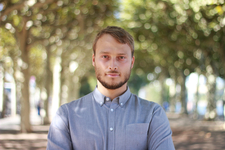Doktorand (Max-Weber-Kolleg für kultur- und sozialwissenschaftliche Studien)
Kontakt
Max-Weber-Kolleg (Steinplatz 2) / Raum 510 (4. OG)
Sprechzeiten
nach Vereinbarung
Besucheranschrift
Max-Weber-Kolleg für kultur- und sozialwissenschaftliche Studien
Campus
Nordhäuser Str. 63
99089 Erfurt
Postanschrift
Universität Erfurt
Max-Weber-Kolleg für kultur- und sozialwissenschaftliche Studien
Postfach 90 02 21
99105 Erfurt

Zur Person
Curriculum Vitae
- 10/2022-07/2023: Fellow at the Research Institute for Philosophy in Hannover (fiph)
- 10/2018-present: PhD student at the Max-Weber-Kolleg, Erfurt and member of the IGS.
- 2015-2018: M.A. in Philosophy, Frankfurt/Main.
- 01/2015-present: freelance collaborator at Fritz-Bauer-Institut, Frankfurt/Main.
- 2009-2015: B.A. in Philosophy, Marburg.
Forschungsprojekt
Widerspruch als Lebensform / Contradiction as a Form of Life
The PhD project “Contradiction as a Form of Life” is predominantly a philosophical one. It aims at a critique of contemporary normative theory by investigating the role of “consistency” for moral justification. It investigates how certain problems of moral philosophy rise from the changes of our socio-religious practices, but are not reflected as such.
Modern moral philosophy claims that the absence of contradiction is necessary for moral obligation and for morality itself: Only what can (or could) be consistently justified to everyone and therefore could not reasonably be rejected by anyone, is entitled to demand compliance. But this claim is flawed. It is not only open for debate who exactly is “everyone” or when a contradiction occurs (and necessarily so), but it also excludes fundamental elements from its reflection.
Hence the project broaches the issue of “Contradiction as a Form of Life” in three ways. Firstly it reconstructs the significance of the concept of “contradiction” for modern moral philosophy and for the modern understanding of reason. By making use of Wittgensteins philosophy of language, it shows secondly how our understanding of contradiction, justification and universality arises from our “form of life” – or “society” in terms of critical theory – and not the other way around. Neglecting the necessary contradictions of our present form of life is constitutive for modern philosophy. Thus the problems of moral philosophy could ultimately be understood as a phenomenon of alienation – they rise when “language goes on holiday”, i.e. when language is muted. The project sketches thirdly how normativity could be understood without the demand for consistency.
Key concerns of the project are therefore to elucidate the concept of a “form of life”, how social practices constitute such a form of life and in which way our understanding of ourselves and the world is structered by it. It is crucial for the project to understand “form of life” not as a functionalist term – Wittgenstein stresses that the practices that constitute a form of life are similar to religious and especially ritual practices: they cannot be proven true or false, or good or bad, they rather form what we understand as true, consistent, evident or good.
To gain insight in the structure of ritual practice as constitutive for self-world relationships the PhD project reads Wittgensteins philosophy of language against its usual interpretation. By putting it into constellation with the critical theory of society, the project aims to answer questions that may not be Wittgensteins own – altough there is plenty of indicatiton that normative and social problems are indeed his main concern. Language philosophy shall be presented thereby not as an alternative to normative theory but as a way to properly investigate those problems.

